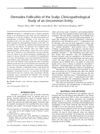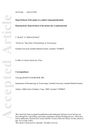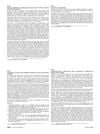November 2021 in “Transplantation direct” A 68-year-old man improved after being correctly diagnosed and treated for a skin condition caused by mites, following a stem cell transplant.
 86 citations,
July 2012 in “British journal of dermatology/British journal of dermatology, Supplement”
86 citations,
July 2012 in “British journal of dermatology/British journal of dermatology, Supplement” There may be a connection between Frontal Fibrosing Alopecia and Lichen Planus Pigmentosus, and more research is needed to confirm this.
 18 citations,
August 2011 in “Clinical Drug Investigation”
18 citations,
August 2011 in “Clinical Drug Investigation” Low-dose isotretinoin combined with pulsed azithromycin cleared acne in most patients, with mild side effects.
 1 citations,
January 2023 in “Cutis”
1 citations,
January 2023 in “Cutis” You might not need to stop cancer treatment if you get a rare skin reaction from EGFR inhibitors, as skin treatments can help manage it.
 192 citations,
January 2015 in “Journal of the American Academy of Dermatology”
192 citations,
January 2015 in “Journal of the American Academy of Dermatology” Targeted cancer therapies often cause serious skin problems that need careful management.
 37 citations,
January 2013 in “Postepy Dermatologii I Alergologii”
37 citations,
January 2013 in “Postepy Dermatologii I Alergologii” Isotretinoin effectively reduces acne but causes dry skin, higher skin pH, more redness, and hair loss.
 31 citations,
June 2015 in “British Journal of Dermatology”
31 citations,
June 2015 in “British Journal of Dermatology” Hormonal treatments are effective as a second-line option for moderate-to-severe acne in females, but should be used with caution due to health risks.
 24 citations,
November 2016 in “Molecular Medicine Reports”
24 citations,
November 2016 in “Molecular Medicine Reports” Hormonal imbalances, often indicating conditions like PCOS, are common in women with hard-to-treat acne, and a treatment approach addressing these imbalances may be needed.
 16 citations,
March 2013 in “JAMA Dermatology”
16 citations,
March 2013 in “JAMA Dermatology” A cancer drug called nilotinib might cause hair loss due to inflammation around hair follicles.
 15 citations,
March 2016 in “The American Journal of Dermatopathology”
15 citations,
March 2016 in “The American Journal of Dermatopathology” Demodex mites rarely cause scalp infections leading to hair loss, but when they do, treatment is effective.
 12 citations,
September 2003 in “Current paediatrics”
12 citations,
September 2003 in “Current paediatrics” Early treatment of acne is important to prevent scarring and improve appearance, using medications that can have side effects.
 11 citations,
January 1998 in “Dermatology”
11 citations,
January 1998 in “Dermatology” Isotretinoin effectively treated severe acne in HIV-positive women, with improved skin and CD4 counts, but some experienced side effects like skin dryness and hair loss.
 6 citations,
July 2006 in “International Journal of Dermatology”
6 citations,
July 2006 in “International Journal of Dermatology” Football players can get many skin conditions from their sport, which need different treatments and can be prevented with good hygiene and protection.
 5 citations,
February 2013 in “Expert Review of Dermatology”
5 citations,
February 2013 in “Expert Review of Dermatology” New acne treatments include combination creams, advanced retinoids, and light therapies, focusing on safety and patient adherence.
 4 citations,
January 2018 in “JEADV. Journal of the European Academy of Dermatology and Venereology/Journal of the European Academy of Dermatology and Venereology”
4 citations,
January 2018 in “JEADV. Journal of the European Academy of Dermatology and Venereology/Journal of the European Academy of Dermatology and Venereology” Panitumumab can cause excessive ear hair growth.
 4 citations,
April 2016 in “Journal of Dermatology Research and Therapy”
4 citations,
April 2016 in “Journal of Dermatology Research and Therapy” Anti-androgens are safe and effective for treating moderate to severe adult female acne.
 3 citations,
March 2011 in “Informa Healthcare eBooks”
3 citations,
March 2011 in “Informa Healthcare eBooks” Acne in children varies by age and severity, requires a pediatric treatment approach, and may need diagnostic evaluation for underlying conditions.
 3 citations,
January 2008 in “Journal of the American Academy of Dermatology”
3 citations,
January 2008 in “Journal of the American Academy of Dermatology” A patient's skin rash did not affect the area where a previous viral rash was healing, suggesting a rare immune response.
 2 citations,
October 2018 in “Springer eBooks”
2 citations,
October 2018 in “Springer eBooks” Cancer treatments can cause skin-related side effects that may affect patient quality of life and require changes in treatment.
 1 citations,
April 2018 in “The journal of investigative dermatology/Journal of investigative dermatology”
1 citations,
April 2018 in “The journal of investigative dermatology/Journal of investigative dermatology” Oral tofacitinib significantly improves lichen planopilaris symptoms without adverse effects.
 November 2019 in “Harper's Textbook of Pediatric Dermatology”
November 2019 in “Harper's Textbook of Pediatric Dermatology” The document is a detailed medical reference on skin and genetic disorders.
 April 2018 in “The journal of investigative dermatology/Journal of investigative dermatology”
April 2018 in “The journal of investigative dermatology/Journal of investigative dermatology” Samcyprone ointment is effective for treating common warts if a sensitization reaction occurs first.
 July 2014 in “Disease-a-Month”
July 2014 in “Disease-a-Month” The document gives treatment advice for various skin conditions, like using metronidazole for perioral dermatitis and minoxidil for hair loss.
 June 2011 in “Oncology times”
June 2011 in “Oncology times” Dr. Mario Lacouture recommends preventive and specific treatments for skin side effects caused by EGFR inhibitors to improve patients' quality of life.
 243 citations,
September 2016 in “Dermatology and Therapy”
243 citations,
September 2016 in “Dermatology and Therapy” Dermoscopy is a useful tool for identifying features of skin conditions, but more research is needed to define its role in dermatology.
 233 citations,
November 2002 in “The journal of investigative dermatology/Journal of investigative dermatology”
233 citations,
November 2002 in “The journal of investigative dermatology/Journal of investigative dermatology” Creating stronger blockers for skin enzymes might lead to better treatment for conditions like acne and excessive hair growth.
 140 citations,
January 2009 in “JEADV. Journal of the European Academy of Dermatology and Venereology/Journal of the European Academy of Dermatology and Venereology”
140 citations,
January 2009 in “JEADV. Journal of the European Academy of Dermatology and Venereology/Journal of the European Academy of Dermatology and Venereology” Liposomes improve drug delivery and reduce skin irritation in dermatology.
 138 citations,
February 2007 in “European journal of cancer”
138 citations,
February 2007 in “European journal of cancer” EGFR inhibitors often cause skin problems and other side effects, but these are usually reversible and can be managed to keep patients comfortable.
 116 citations,
December 2017 in “International Journal of Women's Dermatology”
116 citations,
December 2017 in “International Journal of Women's Dermatology” Adult female acne treatment should be personalized, considering individual preferences and pregnancy, using various topical and oral medications while managing side effects and resistance.
 99 citations,
December 2010 in “Journal of The European Academy of Dermatology and Venereology”
99 citations,
December 2010 in “Journal of The European Academy of Dermatology and Venereology” The document concludes that certain genetic mutations and dietary factors are involved in acne development, and treatments like isotretinoin and diet changes can help manage it.




























